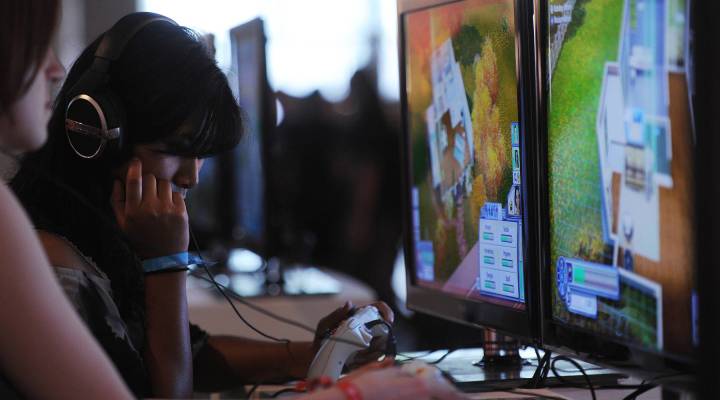
Inside the sexual harassment in online gaming

Tess Vigeland: Online gaming is a $25-billion-a-year industry. An industry well-known for its juvenile young players who back stab, jeer, and verbally spar with their opponents. But the fun-and-games has turned increasingly ugly. And videos have surfaced of verbal, even physical harassment of female players. Amy O’Leary writes about the issue in today’s New York Times and she joins us now. Thanks for being here.
Amy O’Leary: Hi Tess.
Vigeland: So as you point out in the story yourself, name calling is a long-standing fact of life in the gaming industry, so why is there a spotlight on it now?
O’Leary: Over the last six months there have been a series of incidents that were not just incidents where women experienced harassment in a private, online world — but really, there were public faces put to this kind of treatment. One of the incidents was a tournament where some pretty severe harassment was all captured on video.
Vigeland: Those videos were embedded within your story, so let’s take a listen to them.
Aris Bakhtanians on video: The sexual harassment is part of our culture… and if you remove that from the fighting game community, it’s not the fighting game community. It’s “StarCraft.”
So explain to us what was going on there.
O’Leary: That’s Aris Bakhtanians. He was a coach at a video game tournament who had been making a series of aggressive and sexual statements toward one of his players, a woman named Miranda Pakozdi. Mr. Bakhtanians was asked about this by someone else in this room during this tournament. I believe he was trying to explain that the fighting game community is a culture where trash talk is normal and acceptable and that’s part of the fun that people have in this games. Where I think for Miranda, the woman who was being harassed in the tapes, there was a line that was crossed where it went beyond normal trash talk to a point where she felt so uncomfortable she forfeited the tournament.
Vigeland: Wow. She just, what, up and walked out?
O’Leary: Actually, it was kind of sad. She committed a kind of virtual suicide. She was in an elimination round and she just walked her character into the opponent without any defense and was killed off.
Vigeland: As I said, this has been going on for a long time and as you also point out in the article, the standard advice — both in gaming and kind of on the Internet in general — is ignore the trolls.
O’Leary: I think that gamers who want a healthy, supportive community to play in think that the advice to ignore the trolls doesn’t go far enough because what it does is it creates a community where this kind of speech is tolerated. So now you’re starting to see blog posts and petitions and calls for action among gamers to figure out how you can eliminate this kind of speech, how you can police it and report it better, and how communities themselves can shut out players who are creating this kind of intolerant atmosphere.
Vigeland: There’s a dual issue here because this is all happening on the Internet, right? Because you not only have whisteblowing going on, but then that can kind of a powder keg in itself to set off even more harassment.
O’Leary: Absolutely. One of the things we saw with a woman named Anita Sarkeesian, who raised money for a video series she was doing about women in gaming, there was a backlash from the Internet where she received a great deal of harassment, personal threats. And then she took the extra step of documenting it online and a man in Canada made a game where you could punch her face in this online game and layer cuts and bruises on her image because he didn’t like what she was doing. What we’ve seen with the way that the Internet has become, it fuels instant communication and dialogue in a way that you get cycle upon cycle of reaction and backlash, and reaction and backlash.
Vigeland: Amy O’Leary is a reporter with the New York Times. Her article in today’s paper is titled: “In Virtual Play, Sex Harassment Is All Too Real.” Thank you so much for joining us today.
O’Leary: Thank you so much.
There’s a lot happening in the world. Through it all, Marketplace is here for you.
You rely on Marketplace to break down the world’s events and tell you how it affects you in a fact-based, approachable way. We rely on your financial support to keep making that possible.
Your donation today powers the independent journalism that you rely on. For just $5/month, you can help sustain Marketplace so we can keep reporting on the things that matter to you.


















